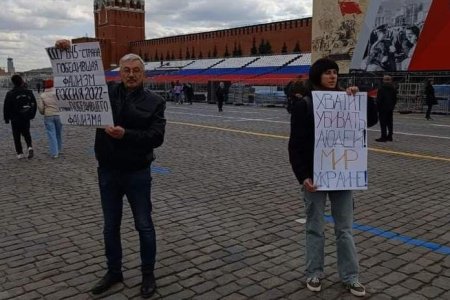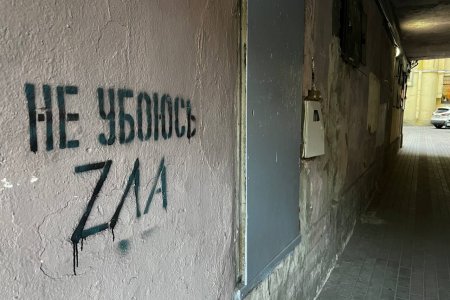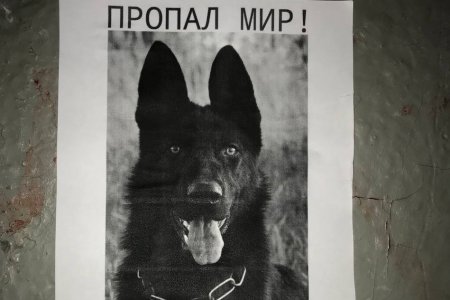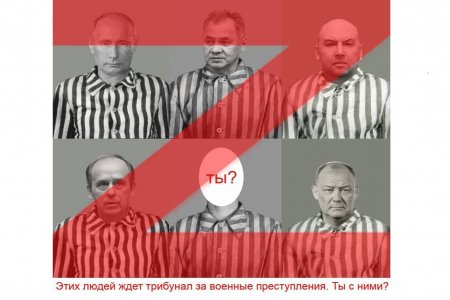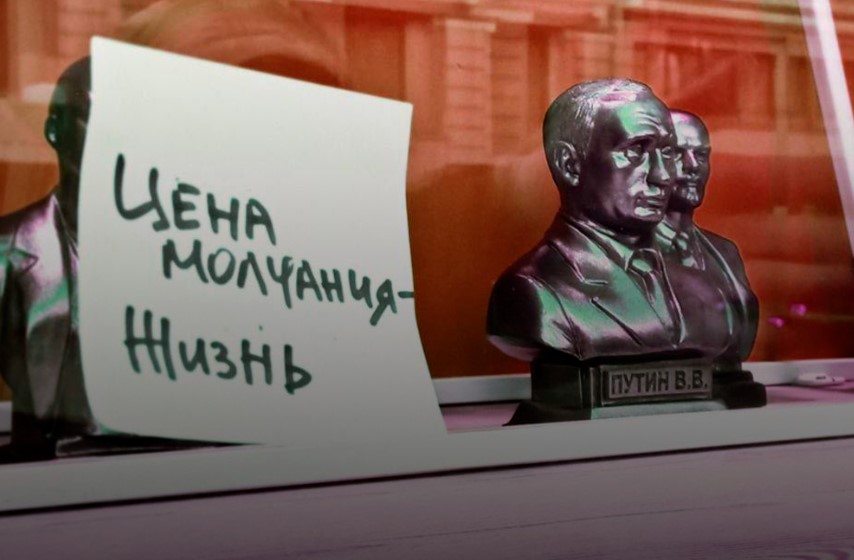
Protests against invasion in Ukraine do not stop in Russia since February 24, despite the repressions that get worse. Mass protests in the first days of the war resulted in the similarly mass arrests and soon the mass street actions ended. On March 4 Volodymyr Putin signed a package of repressive laws on “fakes”. The new Article 20.3.3. of the Code on Administrative Offences introduced the concept of “discrediting the use of armed forces”. “Discrediting” is punishable by a fine of up to 50 or 100 thousand rubles (in case of combining “discrediting” with calls for protests or violation of public infrastructure), and one repeated violation threatens to apply a new article 280.3 of the Criminal Code - if applied, the accused faces a fine up to 100 thousand rubles or 3 years in prison.
In a month and a half the protocols under Article 20.3.3 were issued for a thousand people, while “discrediting” were seen as wearing the clothes and manicures in blue and yellow, posters with 8 stars, as well as quotes by Volodymyr Putin.
In addition to the “discrediting”, the new laws also introduced the concept of “fakes” (knowingly false information) about the use of the armed forces. “Fakes”, which bear no direct difference from “Discrediting”, are already criminally punishable under Article 207.3 of the CC of RF: a fine of up to 700 thousand rubles or imprisonment for up to 15 years.
Currently 35 people are already accused of spreading fakes. The first one to be detained was an artist from Saint Petersburg, Sasha Skochylenko, who replaced the price tags in a store with leaflets containing the information on the hostilities. Despite gluten intolerance, which threatens her life and health, Sasha was sent to SIZO until June.
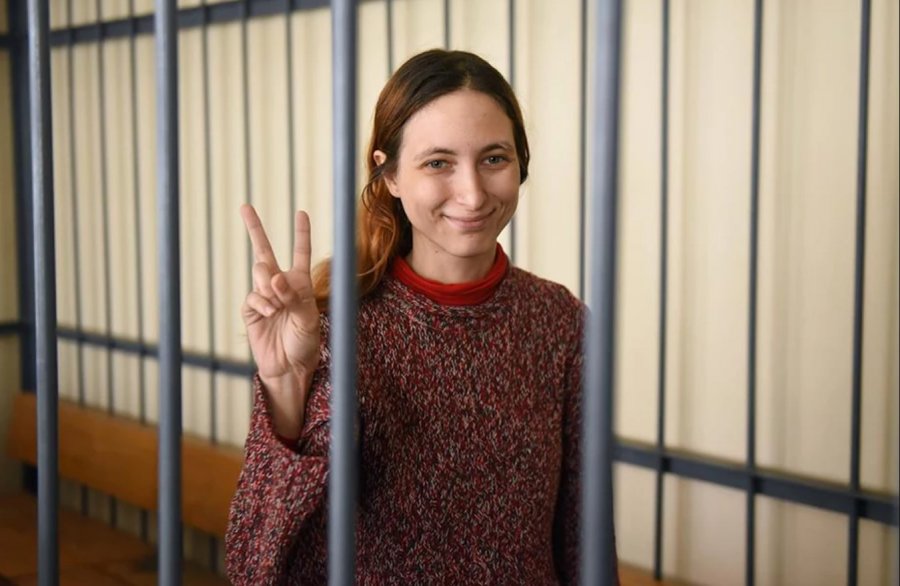
“Ahora International” in its report analyzed that with the introduction of these unconstitutional laws and the censorship essentially established on the first day of the war, martial law has been established in Russia, since the basic constitutional rights were restricted: to freedom of speech, assembly and movement, to private property.
That caused the protest to change its form. Today there is no massive street anti-war movement, but it was replaced by decentralized “guerrilla” protest actions, directed at breaking the silence concerning the war in the official propaganda. In addition to individual pickets, the activists countrywide arrange anti-war performances, distribute leaflets and create memorials dedicated to people who died in Mariupol and other Ukrainian cities.
Several civil movements, such as “Spring”, ”Feminist anti-war resistance” and “Students against war” regularly use the new formats, extending the potential of the protest, seeking to involve new social groups in it.
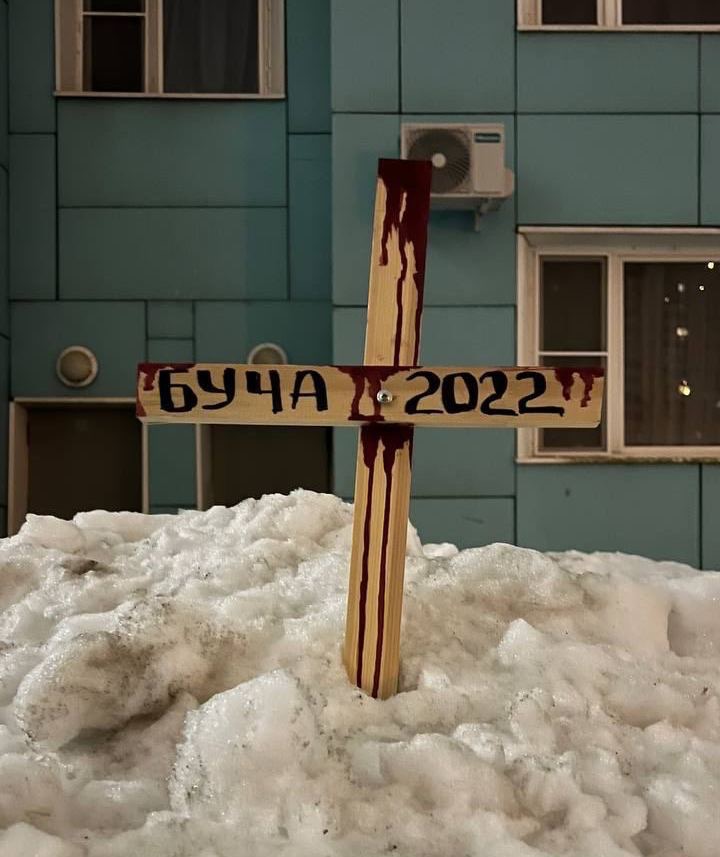
In this digest we selected the information on the actions that took place last week. It is compiled on the basis of information by “OVD-Info” on the people arrested for the anti-war position. We also added some actions that did not end up in detention for the activists. The digest shows – despite the lack of the mass meetings, the Russian fight against the war continues.
According to OVD-Info, since the introduction of the Article on the “discrediting of the Armed Forces” in the administrative code the police issued 993 protocols for the people countrywide. Most of the protocols from this article were in Moscow, St. Petersburg, Kaliningrad and Tomsk regions, as well as in the Crimea. Only in seven regions of Russia there are no such administrative cases. Protesters are not deterred by criminal and administrative prosecution, which is sometimes absurd.
- In Moscow, a young man was detained near the Church of Christ the Savior with a poster on which was printed the sixth commandA person was arrested in Krasnodar who brought outside and burned his sofa, having written “ZEvil” on it – with the use of letter Z, which became a loyalist symbol of the war in Ukraine. The arrested said that his girlfriend lives in Mariupol and have not been in touch since the first days of the war.ment of Moses, which says: “Do not kill!”. Many priests of the Russian Orthodox Church spoke out against the war - the official clearance continues to support the state in all its actions.
- In Ufa a local activist wrote on the poster a quote by a rapper, Tupac Shakur. The quote said “They’ve got money for the war, but they cannot feed the poor”
- The activists were arrested near a government building in Moscow, who arranged a picket with the inscription “Bombing for piece is like banging for innocence”.
- In Saint Petersburg the law enforcement bodies considered the “discrediting” of the army a quote from a child’s cartoon “The Adventures of Leopold the Cat”, quoting “Guys, let’s live friendly”.
- In Pskov, police issued a report on the “discrediting” of the army for a teacher who posted on social media a photo with a poster “No to War” on the background of the school blackboard.
- In Krasnodar, a woman was fined on the denunciation of a colleague who contacted the police, because of a page on Instagram with the image of a human mouth, as if sewn with the letter Z.
- In addition, Roskomnadzor blocked the site of the Russian service The Moscow Times because of the news on OMON fighters who refused to go to war with Ukraine.
Despite the great risks, quite vocal against the war are politicians, journalists and cultural figures, whose voica can be heard by many.
- On Friday the Basmanny Court of Moscow sent Volodymyr Kara-Murza to SIZO until June 12. According to the investigation, he was spreading “erroneous” information on the actions of the Russian army in Ukraine, speaking in English at the Arizona House of Representatives in the United States. The politician faces five to ten years in prison.
- At the Moscow Art Theater School-Studio, teacher Mikhail Durnenkov was fired after he wished good luck to the Ukrainian army and a “devastating defeat” to Russia in a post on his Facebook page.
- Rock band DDT refused to perform in a hall where there was a huge letter Z, – because of that their concert in Tumen was canceled. The organizers tried to move the event to another venue, but later they were forbidden to do so by some unknown people close to local authorities.
- In Moscow “Theater on Taganka” canceled the performance of actress Julia Aug, who spoke out against the war with Ukraine. Shortly before that, State Duma deputy Alexander Hinstein called on the Department of Culture to “deal” with the “anti-Russian position” of the actress.
- The host of the “100 to m1” TV show, Oleksandr Gurevich, commented on Youtube Channel of the “Russia 1” TV channel with the calls to stop the war. According to the host, the episodes of the show that are first airing on the channel, and then are published on Youtube, were recorded before the war, and now, against the background of what is happening, he considers his jokes and good mood to be “inappropriate”. The TV channel promptly deleted the videos that had Gurevich’s comments.
- Organizers of the international Russian-speaking poet award named after Arkadiy Dragomoschenko stated about the termination of their work. In their statement they said about their solidarity with Ukraine, called the “special operation” a shameful, bloody action that cannot be justified. They also expressed confidence that the normalization of cultural life in Russia today is impossible.
- Viktor Shalyakin, the head of the Novgorod Yabloko, was charged with three counts: “discrediting the army” for an anti-war post, “disrespecting the president” for a video in which he called Putin an “antichrist”, and “illegal spreading of agitation” for writing “For the world” on the party banner next to a candidate who condemned the hostilities.
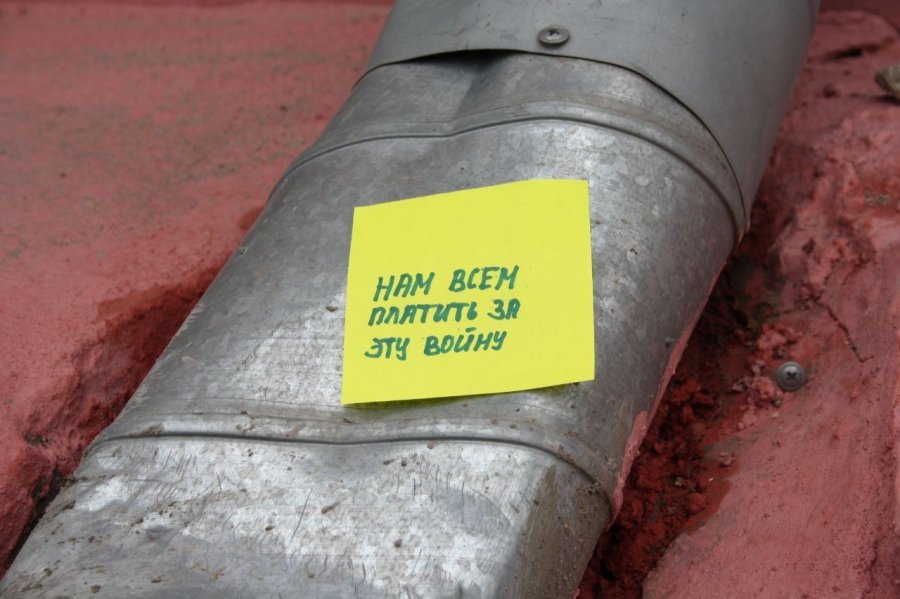
A relatively new form of protest spreads among those who do not have an opportunity to openly state their opinion – a “quiet picket”: people invisibly leave inscriptions on the walls, stick the stickers, wear pacifist symbols on clothes. Some initiatives deserve special attention.
- Banknotes and coins with anti-war inscriptions are spread countrywide.
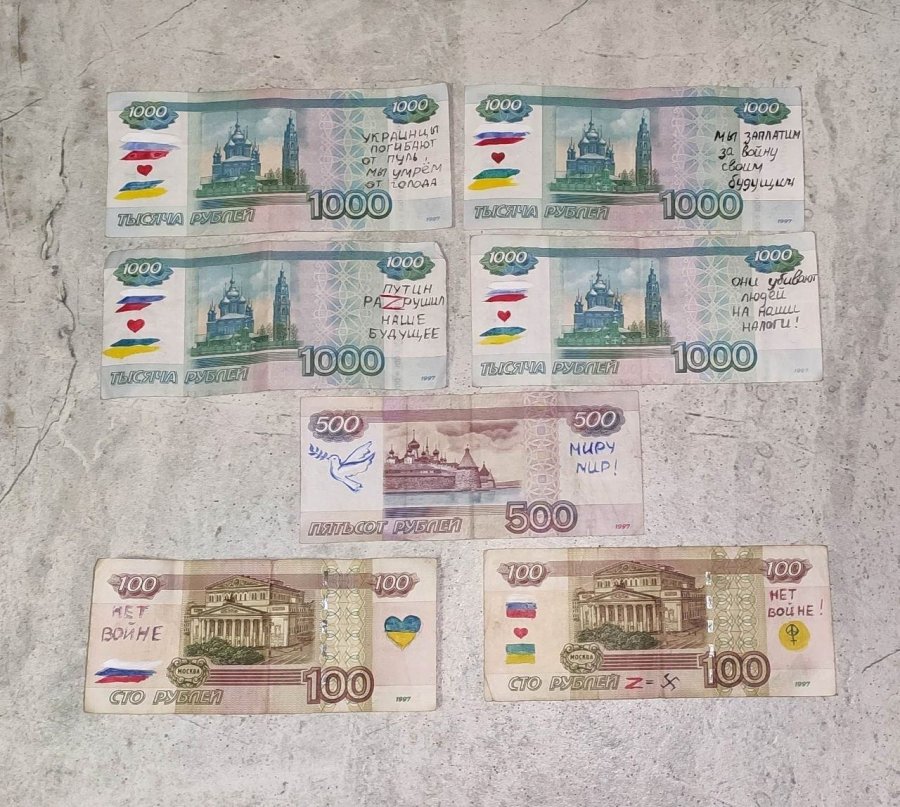
- Feminist anti-war resistance announced an action of laying flowers to monuments and memorials to those killed in World War II. Notes with anti-war content are added to the flowers.
- The flowers are also brought to m”Kyivska” subway station in Moscow.
- Handwritten posters appear in the entrances and bus stops with links to independent publications and bloggers covering events in Ukraine.
- Activists leave books in public places in which they put anti-war leaflets.
- Informative stickers with similar emblems of Nazi Germany and the caption “Who are you?” were seen on some cars with the Z symbol.
The review was prepared by the Memorial volunteers on the basis of the following sources: OVD-Info, Kholod, telegram channel Visible Protest, media.az, telegra.ph.
